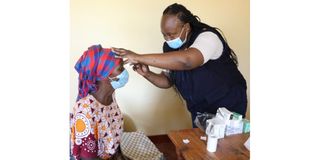Residents of remote Taita areas benefit from county eye clinic

Clinical Ophthalmologist, Seline Alucheri, examines a patient at Modambogho dispensary in Taita Taveta County. More than 4,600 residents have been screened during community outreach clinics across the county.
For five years, 95-year-old Esmil Chao's prayer was to get her sight restored so she could see her grandchildren and the world around her once more.
Ms Chao’s vision deteriorated gradually until she realised she was completely blind.
Blind and elderly, she relied on her family to meet her needs.
"The worst part was that I was no longer able to see my beloved family, especially my grandchildren," she said at her home in Mazola, Taita Taveta County.
The grandmother, who can now see with her right eye after undergoing cataract surgery last month, told Nation.Africa that she might live longer now that she can see the smiles on the faces of her family members.
"At my age, I value such small things. For five years I underwent agony and suffering," she said.
Ms Chao was one of the hundreds of people who patiently queued to receive treatment at the Modambogho dispensary during an eye camp organised by the county government in partnership with the Fred Hollows Foundation.
Her family pushed her to the clinic in a wheelbarrow.
After diagnosis, she underwent surgery at Mwatate Sub-County hospital last month and woke up to a brighter world after years of dark days.
"When I came home I gathered all my grandchildren just to see their faces. To my surprise they were all grown," she said.
Though her vision is not yet 100 percent restored she can now see her grandchildren’s faces and she reveals that her food now tastes better.
Her daughter-in-law, Safnia Wakesho, said Ms Chao’s vision started receding due to old age.
She said the family did not have money for medical interventions.
"She was overjoyed after she regained her vision. She is also getting better in terms of her general health because she is happy," she said.
Visual impairment and blindness are major health concerns, especially in rural and remote areas of the county. Among key barriers to eye treatment services are poverty, inaccessibility, and inadequate healthcare.
Since the launch of a Sh6 million eye clinic at Moi County Referral Hospital in Voi in September last year, 4,600 residents have been screened, 2,000 treated and over 400 received surgical treatment.

A patient being screened at Modambogho dispensary in Mwatate, Taita Taveta County
The clinic was founded by the Australian government-funded Fred Hollows Foundation in partnership with the county government.
The organisation had donated state-of-the-art eye-care equipment and consumables to kick-start services at the clinic.
Through the partnership, residents can now get specialised eye-care services including eyelid surgery, corneal perforation repair, anterior chamber washout, orbital exenteration surgery, trabeculectomy surgery, conjunctival surgery, and capsulotomy.
Previously, residents sought these services at clinics outside the county.
The county department of health has now rolled out community outreach clinics to promote eye care and prevent avoidable blindness in far-flung areas as it seeks to offer high-quality and low-cost treatment.
With inadequate specialists and limited services, there is a high prevalence of avoidable vision impairment in the area.
Dr Asha Udu, an ophthalmologist and surgeon, noted that the eye problems detected among many residents during the camps are preventable.
The eye-care centre has made tremendous strides as more residents now have access to services.
Using eye-care services, she said, is essential to reducing the burden of visual impairment and blindness.
She said most of the conditions can be managed if treated early and urged residents to visit health facilities for advice on proper medical interventions.
"Most of these conditions can be treated if they are detected early. People should avoid getting drugs over the counter because they can complicate the condition," she said.
Health executive John Mwakima said the department is also creating awareness about the eye-care clinic services at Moi Hospital, especially among rural communities.
He concurred that residents of remote areas of the county are usually of lower socioeconomic status and therefore do not have adequate eye-care services because they cannot afford them and the services are not available.
These, he said, often lead to visual impairment and blindness.
Records at the centre show that over 2,000 patients have healed after getting treatment through the clinic.
"Since we opened the clinic, our records show that the number of people with eye problems attending the clinic has increased. We plan to hold such camps in all wards by January next year," he said.





